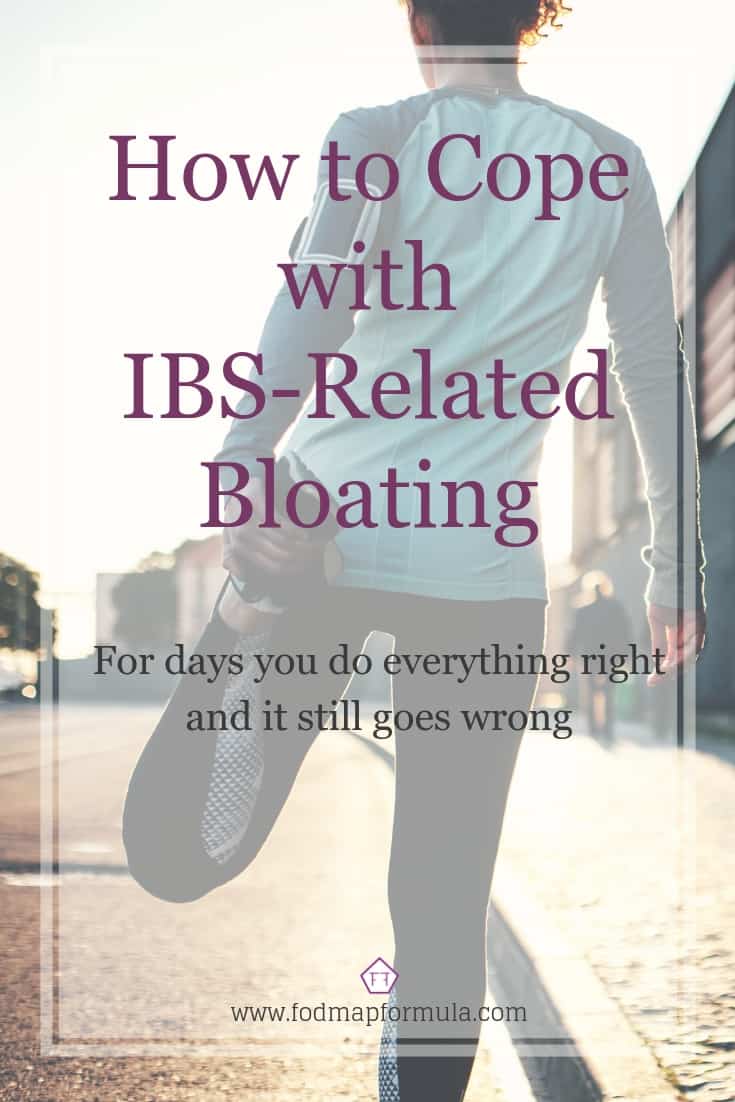Bloating and abdominal pain are common complaints in the IBS community. But, while there are plenty of articles on the top ten foods we should never eat, suggestions for products we can purchase, and anecdotal evidence on finding temporary relief, I haven’t found much information on how to cope with IBS related bloating in the moment.

It Was the Best Idea/It Was the Worst Idea
I decided to write this article after competing in the 2017 Scotia Bank Toronto Waterfront Marathon. I trained for eight months, I ate a nutritious and well-balanced diet, and strictly adhered to my customized low FODMAP plan. I went to sleep the night before my race looking and feeling like a prepared athlete. I woke up the next morning looking like I might give birth to twins in the starting corral.
I know my symptoms were caused by anxiety over my first major race, but it really tarnished the experience for me. I felt uncomfortable in my clothes, I felt self-conscious standing in the starting corral, and like I wasn’t in control of my body every time I passed a race photographer.
Post-race, as my family celebrated around me I was overwhelmed with the feeling that I had done everything right, but this wasn’t how I was supposed to look, and these weren’t the pants I wanted to wear. It was an incredibly frustrating experience for me. Especially as someone who teaches about the life-changing impact of the Low FODMAP Diet.
Because I’ve heard this story repeated almost daily in the IBS community, I thought it might be helpful to talk about strategies to cope with IBS-related bloating when things go off the rails.

Those feelings Need Sieving
I spoke with Dr. Barbara Bolen, a US-based health coach and IBS expert, who believes part of coping effectively with IBS-related bloating means being able to separate feelings based on the current situation from our thoughts and assumptions.
Dr. Bolen explained that feelings of anger and disappointment are a direct reaction to our current situation. Though they aren’t pleasant, they are a healthy expression of how we feel. She specified these feelings are “our psyche’s way of giving us feedback about our world.” As such, feelings like these should be validated, because they show us how our immediate situation is sitting in us.
She continued, saying feelings of embarrassment or shame, however, are based on assumptions of how we think things should be; or how we imagine others expect them to be. This means, in addition to our genuine feelings, we’re also flooded with emotional reactions based on information that may or may not be true.
Using the example of IBS and bloating, Dr. Bolen said distorted thoughts might sound like: “I should be in control of how my body looks” or “people will judge me negatively because of how my body looks.” But, Dr. Bolen was quick to point out that no one has absolute control over their body. Additionally, she suggested that most people are so wrapped up in themselves they often don’t notice the people around them. Dr. Bolen believes that once these “distorted” thoughts have been challenged, our remaining and genuine feelings will become more manageable.
Mirror, Mirror
I also spoke to Jay Walker, a Toronto-based mental health and body image advocate, who said that our perception of our bodies are greatly influenced by unattainable ideals. This means when we experience symptoms like abdominal distension, the input we use to determine if our bodies are “acceptable” or “unacceptable” is often skewed.
When asked about coping with a chronic condition that can alter the shape of your body, Walker said: “you are not alone in navigating a society that projects completely unrealistic gender, culture, and body-based standards on all people.” Walker suggests that self-care and self-compassion are two important pieces for people dealing with body issues both in and outside the IBS community. Walker went on to suggest that:
Living with chronic illness can at times leave a person feeling misunderstood, isolated, and with feelings of hopelessness. Finding community can be life-changing when it comes to navigating these physical and emotional difficulties.
If this is something you think would be helpful to you, there are many active online IBS communities available on Facebook and Reddit, as well as public online forums dedicated to Irritable Bowel Syndrome.
Building Tomorrow’s Foundation
I also spoke with Toronto-based psychotherapist Natalie Riback, who emphasized that it’s important to remember “in every endeavour we take on, there will be days when we feel successful, and other days where we feel like we’re spinning our wheels.” Riback said it’s important to be mindful that how we feel about ourselves can play an important role in influencing our failures and successes. This means it’s important to frame our experiences based on tangible evidence, not distorted thoughts or our best attempts at mind-reading.
Living with IBS is challenging as, in the case of my story and many others, a person can do everything right and still experience painful and problematic symptoms. When discussing the impact of chronic IBS related bloating on our long-term body image Riback emphasized:
The thing we must always remember when we are having a bad day, despite the efforts we’re making to stay on track, is intention. Our intent, our objective remains the same, even when we feel out of sync, even when our body is not responding the way we want it to or even think it should. If we can stay close to the intention we have to be better and stronger, it will not only help get us through the tougher days but we are far more able to get back to a place of success when things come back into alignment.
This being said, it’s important to remember that even when you find the tools to manage your IBS symptoms long-term, there will be stress, and illness, and poor sleep, and sneaky FODMAPs that derail you. That’s life, not failure. It’s ok to be disappointed, or frustrated, or angry about it. But don’t give up hope that your symptoms are temporary, and that there are better days ahead.
Final Thoughts
I took a lot of things away from my personal marathon experience. First, a keen awareness that the symptom-management tools I employ each day aren’t foolproof, and that their failure is not my failure. Second, that a bad day is not an excuse to lose sight of my overall goals or to cheat myself out of a good tomorrow. Finally, that part of suffering from Irritable Bowel Syndrome means being prepared to face my illness head-on every day. For me, this means lacing up and training for my second marathon; knowing I might not look the way I want to on race day, and buying my lucky pants in two sizes – because next time I’m smiling in those photos no matter what.
You might also like one of these:
- Does Heat Trigger IBS Symptoms? Wondering why your guts get mucked up in the heat? Here are some thoughts on why your IBS is not a fan of summer.
- How to Relieve Trapped Gas Need some help letting it go? These practical tips will help you prevent trapped gas when you can and relieve it when it strikes.
- Understanding IBS and Exercise Sometimes you can do everything right and things will still go wrong. I interviewed the experts for tips on coping with symptoms when our bodies feel out of our control.
If you like this post don’t forget to share it! Follow me on YouTube @flipyourleaf for a ton of videos on understanding FODMAPs, IBS mechanics, and how to feel safe in your body. Together we’ll get the low FODMAP diet down to a science!



